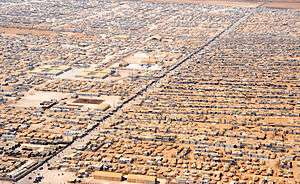Rukban
| Rukban الركبان Al-Rukban | |
|---|---|
| Area | |
 Rukban | |
| Coordinates: 33°17′54.9″N 38°39′25.7″E / 33.298583°N 38.657139°ECoordinates: 33°17′54.9″N 38°39′25.7″E / 33.298583°N 38.657139°E | |
| Country |
|
| Governorate | Mafraq Governorate |
| Population | 75,000 |
Rukban is an arid remote area in the extreme northeast of Jordan, near the joint borders with Syria and Iraq. Rukban lies along the berm between Jordan and Syria.
Refugees coming from Rukban were denied entry by Jordan, citing security concerns regarding the presence of Islamic State sleeper cells. The area became a de facto refugee camp, which drew heavy criticism and condemnation to Jordan by Human Rights Watch in 2015.
On 21 June 2016, Jordan's northern and eastern borders were sealed and were designated as a closed military zone after a Jordanian military outpost was attacked by a booby-trapped car in Rukban, leaving 6 dead and 14 injured soldiers.
Syrian Civil War spillover
Rukban is a completely arid remote area that became inhabited by a number of Syrian refugees in 2014. Jordan welcomes refugees from several crossings that exist along the border with Syria, and the country has welcomed over 1.4 million Syrians by 2016. This specific border point became inhabited by asylum seekers as Jordan had blocked their access, however, it allows around 50 to a 100 of them to pass into the country after strict screening; the government cites security concerns regarding intel on the presence of hidden Islamic State sleeper cells.[1] Jordan says that the refugees in this area have arrived mostly from Islamic State controlled territories such as Al-Raqqa, and that IS sleeper cells infiltrated these refugees. The concerns were deemed legitimate by the UN, but the organization called on Jordan to immediately allow refugees in Rukban to access the country.[1] The number of Syrians there rose to 75,000 in 2016, becoming a de facto camp, which drew heavy criticism and condemnation to Jordan from Human Rights Watch in 2015.[2]
At dawn on 21 June 2016, an ISIL car crossed over from Rukban on Syrian territory and managed to reach a Jordanian army outpost designated for the distribution of humanitarian aid to refugees. The car exploded, killing 6 and injuring 14 Jordanian soldiers.[3]
Jordanian minister of foreign affairs Nasser Judeh said in a press conference "we don't need a hideous terrorist attack like this one to prove to the world the legitimacy of our security concerns". He added "we will not put the lives of our soldiers and our country at risk because this is not Jordan's problem alone, this is an international responsibility", "Jordan has provided for refugees what no other country has, with regard to its resources. We will not allow anyone to take the higher moral ground". Jordan afterwards declared its northern and eastern borders closed military areas, and stressed that the armed forces' border guards will not tolerate any uncoordinated movements approaching its borders and that force will be decisively used against it.[4]
Despite this, Human Rights Watch continued to condemn Jordan, most recently on 7 September 2016, due to deteriorating life conditions in Rukban after humanitarian aid was halted due to fears from further terror attacks against the Jordanian army and international humanitarian aid agencies.[5]
During Angelina Jolie's visit to Syrian refugee camps in Jordan on 9 September 2016, she made the following statement during a press conference "This is not a problem of Jordan's making, or that Jordan should be left to bear alone. Jordan has been warning for years that they could reach a point where they on their own could do no more. The world has known about the situation on the berm for months but no solution has been put forward."[6]
See also
References
- 1 2 "Jordanian troops killed in bomb attack at Syria border". BBC. 21 June 2016. Retrieved 21 June 2016.
- ↑ "Jordan: Syrians Held in Desert Face Crisis". Human Rights Watch. 8 December 2015. Retrieved 21 June 2016.
- ↑ "6 troops killed, 14 injured in car bomb attack on Syria border". The Jordan Times. 21 June 2016. Retrieved 21 June 2016.
- ↑ "الأردن يبحث عن "صيغة" دولية جديدة للتعامل مع ملف اللجوء السوري ووزير الخارجية لسي إن إن : لسنا بحاجة لإرهاب بشع حتى يقتنع العالم بمتطلباتنا الأمنية". Retrieved 2016-08-11.
- ↑ https://www.hrw.org/news/2016/09/07/jordan-new-satellite-images-syrians-stranded-border
- ↑ https://www.yahoo.com/news/jolie-decries-fate-syria-refugees-jordan-border-174850768.html?soc_src=social-sh&soc_trk=fb
